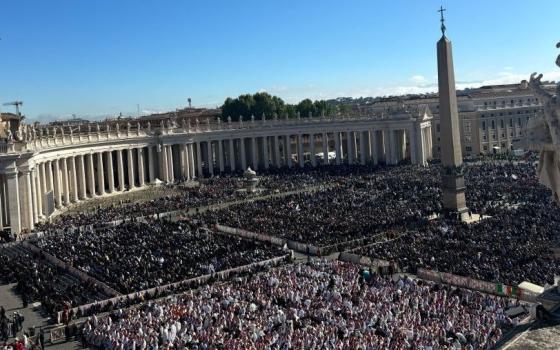Hikers walk past a field of wild daffodils in the Perlenbach-Fuhrtsbachtal nature preserve near Höfen, Germany, on April 16, 2021. (CNS/Reuters/Wolfgang Rattay)

Environmental advocates, including sisters at the United Nations, are lauding a U.N. resolution declaring that it is a universal human right to have access to a clean, healthy and sustainable environment.
The July 28 resolution, approved by 161 nations and co-sponsored by 100 countries, says the right to a healthy environment "is related to existing international law and affirms that its promotion requires the full implementation of multilateral environmental agreements," UN News reported.
U.N. Secretary-General António Guterres said the resolution will help accelerate countries' implementation of their legal obligations and commitments to environmental protection.
"The international community has given universal recognition to this right and brought us closer to making it a reality for all," he said.
Sr. Durstyne "Dusty" Farnan, an Adrian Dominican sister who represents the Dominican Leadership Conference at the U.N., told Global Sisters Report in an email that the resolution is "another way of saying how significant climate change is in today's world."
"This is a wonderful step forward," she said. "It means more member states are mindful and committed to a safer environment for us all. It is important for the sake of climate change that we believe that all people have a right to a healthy environment so that we can progress."
Beth Blissman, the U.N. representative for the Loretto Community, also welcomed the resolution: "It demonstrates that U.N.-member states are beginning to connect the dots between human rights and the current 'triple' planetary crisis of climate change, biodiversity loss and pollution."
She added: "It also gives us hope that diplomacy and multilateralism are still powerful tools in the effort to not only vision, but actually enact, a better future and working in collaboration with our Indigenous sisters and brothers and all who speak for Earth."
In a July 28 statement, Franciscans International, which represents Franciscan congregations at the U.N., said the resolution "is an important step toward stronger international and domestic efforts to help preserve the environment worldwide."
It noted that while the decision reaffirmed an October 2021 resolution by the U.N. Human Rights Council, the fact that the General Assembly approved the resolution "carries additional significance" because the General Assembly is the only U.N. body in which all member states are represented equally.
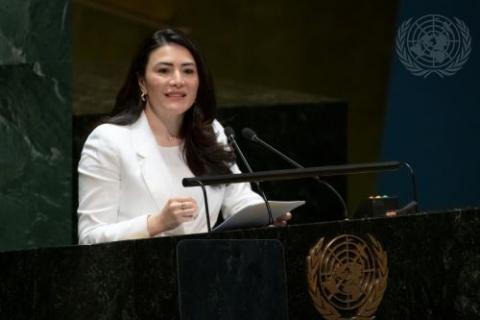
Maritza Chan Valverde: Maritza Chan Valverde, deputy permanent representative of Costa Rica to the United Nations, introduces a resolution on "the human right to a clean, healthy and sustainable environment" to the U.N. General Assembly on July 28. The resolution was adopted with 161 votes in favor, 0 against and 8 abstentions. (U.N. photo)
"This decision is truly historic. However, it is also long overdue and comes at a time when all warning signs are on red and we are quickly running out of options to avert a global environmental catastrophe," Sandra Epal-Ratjen, the Franciscans' international advocacy director, said in the statement.
"It is now undeniable that the right to a clean, healthy and sustainable environment is a human right that should be enjoyed by all. After this vote, all states must commit to its realization."
The Franciscans' statement noted that the vote came after "a long and sustained international advocacy campaign by broad coalitions and follows calls by over 1.350 civil society organizations, indigenous peoples, social movements and local communities."
It added: "The decision by the General Assembly also sends a strong message confirming that the struggle for environmental justice is indeed a human rights struggle."
Michelle Bachelet, the U.N.'s High Commissioner for Human Rights, also lauded the resolution but said that "simply affirming our right to a healthy environment is not enough."
"The General Assembly resolution is very clear: States must implement their international commitments and scale up their efforts to realize it. We will all suffer much worse effects from environmental crises, if we do not work together to collectively avert them now," she said, according to UN News.
Eight countries abstained in the vote: Belarus, Cambodia, China, Ethiopia, Iran, Kyrgyzstan, Russia and Syria.
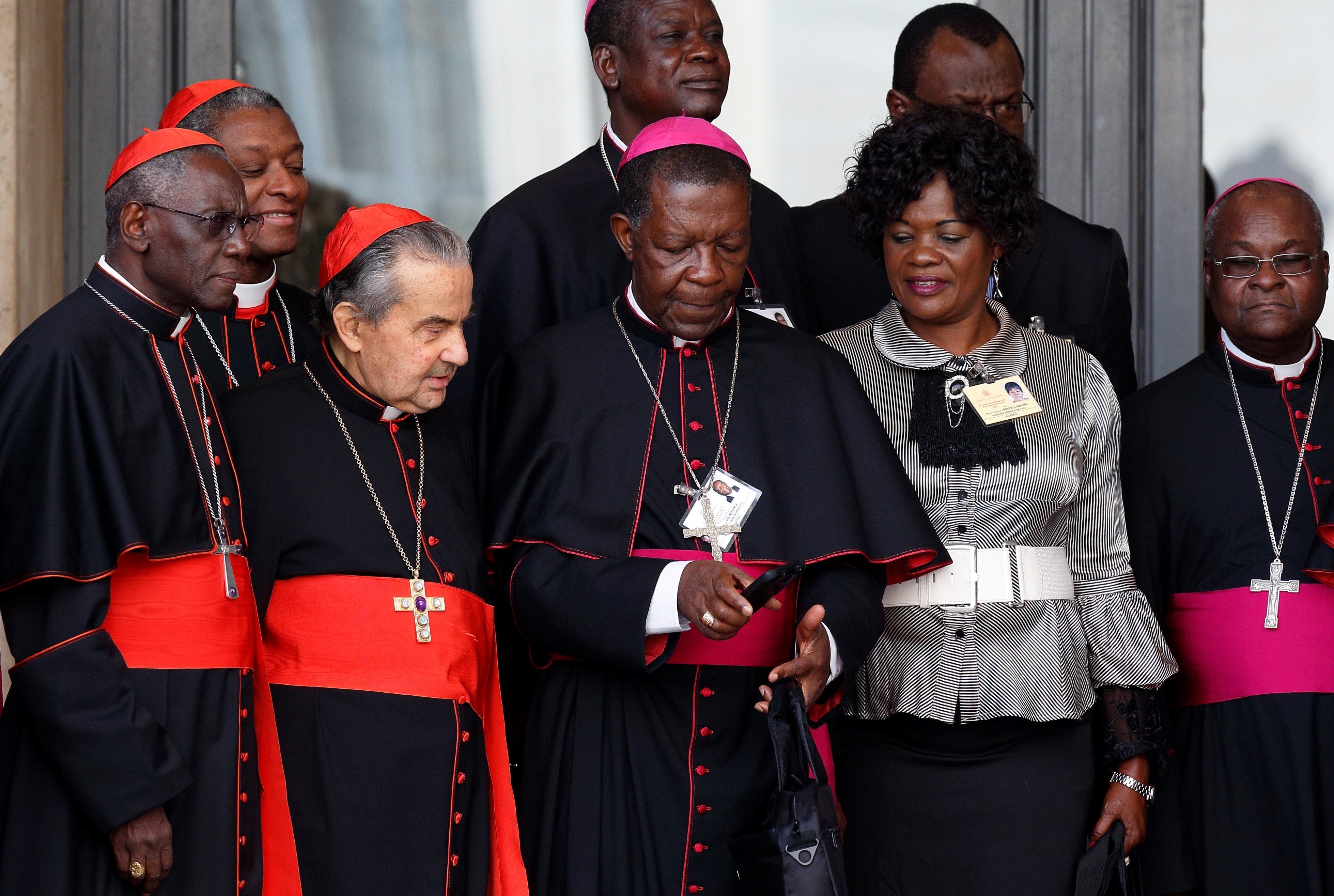
Bishop Nicolas Djomo, center front, stands with other bishops, cardinals and a lay auditor after an October 2014 session of the Synod of Bishops on the family. Djomo, recently retired bishop in the Diocese of Tshumbe, Democratic Republic of Congo, failed to follow Vatican guidelines in dealing with allegations of a 2020 rape of a 14-year-old girl by a diocesan priest, The Washington Post has reported. (CNS/Paul Haring)
DRC diocese responds to Washington Post report of abuse coverup
The Diocese of Tshumbe in the Democratic Republic of Congo has responded to a recent investigation by The Washington Post that concluded that the diocese's retired bishop failed to follow Vatican guidelines about sexual abuse allegations against a priest accused of raping a teenage girl who was training to be a novice.
In a five-page statement released July 19 and distributed to U.S. clerics and advocacy groups concerned about African issues, the diocese addressed the conclusions of a July 15 front-page article that faulted Bishop Nicolas Djomo.
Fr. Michael Shosongo, director of communications for the diocese, said in the statement that the bishop "never covered [up] a case of sexual abuse."
The statement said the diocese is, "as it has always been, committed to transparency and accountability" and believes it is important to report on mishandling of sexual abuse cases. The statement said The Post had been manipulated by those who were "vested with agendas they do not reveal to the media."
Among the charges made in the diocese's statement: The religious association involved in the case, Sisters Servants of Mary, Comforter of the Afflicted, had a questionable charism, and the formation of members "centered on lies, duplicity and belief in witchcraft" as well as disobeying the bishop.
The statement also said those joining the Sisters Servants of Mary, Comforter of the Afflicted were told that by joining it they might be able to immigrate to the United States.
The statement said foundress Sr. Charlotte Ekumu engaged in "obstinate disobedience" toward the archbishop and plotted against Fr. André Olongo, the priest accused of the rape, after Olongo was named to oversee the society amid allegations the society was not adhering to "canonical norms."
Ekumu told Djomo of the alleged rape in March 2020. The girl was 14 at the time.
Advertisement
"The best way they found to take Olongo down was to accuse him of raping a minor," the diocesan statement said.
The Post reported that the Sisters Servants of Mary, Comforter of the Afflicted have left Tshumbe and are now based in Kinshasa, the country's capital.
In its July 15 report, The Post noted that Pope Francis recently accepted Djomo's resignation, as the African prelate turned 78 on July 3. Bishops are required to resign when they turn 75, though the Vatican often allows them to continue past that age. Following custom, The Post reported, the Vatican has not said why the pope waited until June to accept Djomo's resignation.
The Post reported that Djomo said that following its investigation, the Vatican concluded there were insufficient grounds to show wrongdoing by the priest.
The Vatican told The Post that its Dicastery for the Doctrine of the Faith reviewed the case and determined it could not "proceed any further."
"Should further, certain evidence be supplied by civil authorities, by the accusers, or by other witnesses, it would unfailingly be taken into due consideration," the Vatican's statement said.
The main conclusion of The Post investigation is that "nuns, priests and the alleged victim who pressed Djomo about the accusations say he orchestrated a coverup that upended the life of the victim, kept his own reputation intact and absolved the alleged abuser within the church's own system."
Olongo, the accused priest, has been able to return to his priestly duties, including saying Mass, The Post reported.
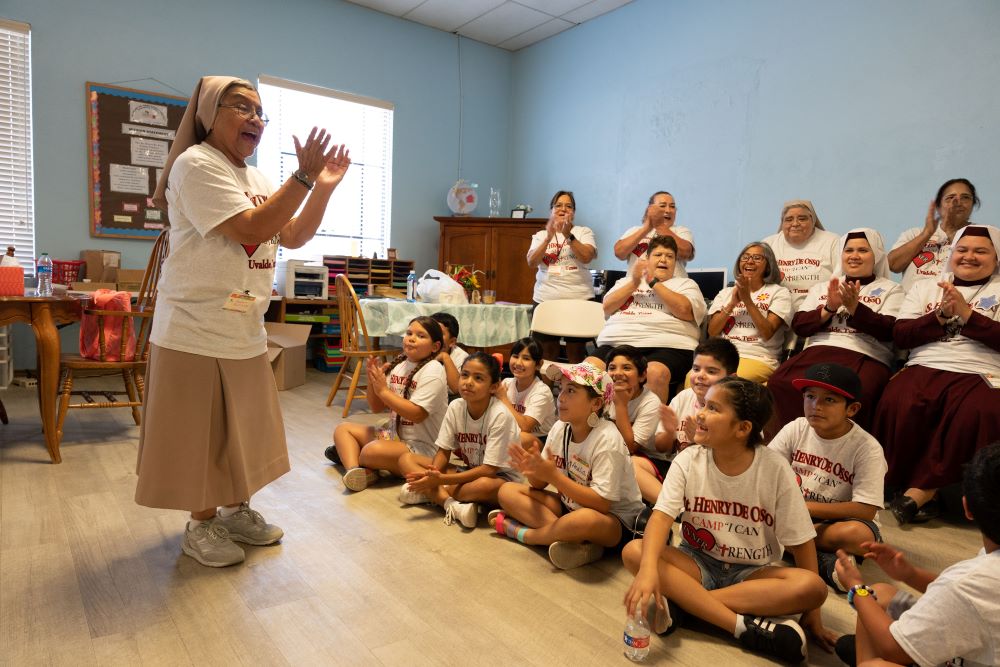
Teresian Sr. Dolores Aviles interacts with children attending Camp I-CAN, which was held July 25-28 at the St. Henry de Osso Project Center in Uvalde, Texas. (Courtesy of Catholic Extension)
Sister-run camp helps in healing for children after mass shooting
Chicago-based Catholic Extension recently completed a weeklong sister-run camp in Uvalde, Texas, to help children heal from the May 24 mass shooting at Robb Elementary School.
The camp — called I-CAN, for "Inner strength, Commitment, Awareness, and Networking" — was held July 25-28 at the St. Henry de Osso Project Center in Uvalde and provided children in the third, fourth and fifth grades a safe space to heal, experience fun and "gently" reintegrate the children "into a school-like setting around their peers," the organization said in a statement.
The camp was led by Sr. Dolores Aviles, a member of the Society of St. Teresa of Jesus and an Uvalde native who had family members who died in the shooting. Aviles worked with 13 other sisters.
Catholic Extension is a fundraising organization whose mission is to ensure "that all American Catholics can practice their faith within vibrant faith communities" and "to build up Catholic faith communities in underserved regions."
The camp project is the first of a series of initiatives the group has planned to help Uvalde children and the wider community recover from trauma from the shooting, in which the shooter killed 19 students and two teachers.
The majority of the children who attended the camp were survivors of the shooting, though all Uvalde children in the third, fourth and fifth grades were invited to participate.
"Uvalde has experienced an unspeakable and senseless violence, and the community is undoubtedly still traumatized and processing grief," Fr. Jack Wall, Catholic Extension's president, said in a statement.
"It is our goal, that through the spiritual accompaniment of religious sisters, the children and their families of Uvalde, TX feel God's presence, and are reminded that they are not forgotten or alone in the coming year and beyond."
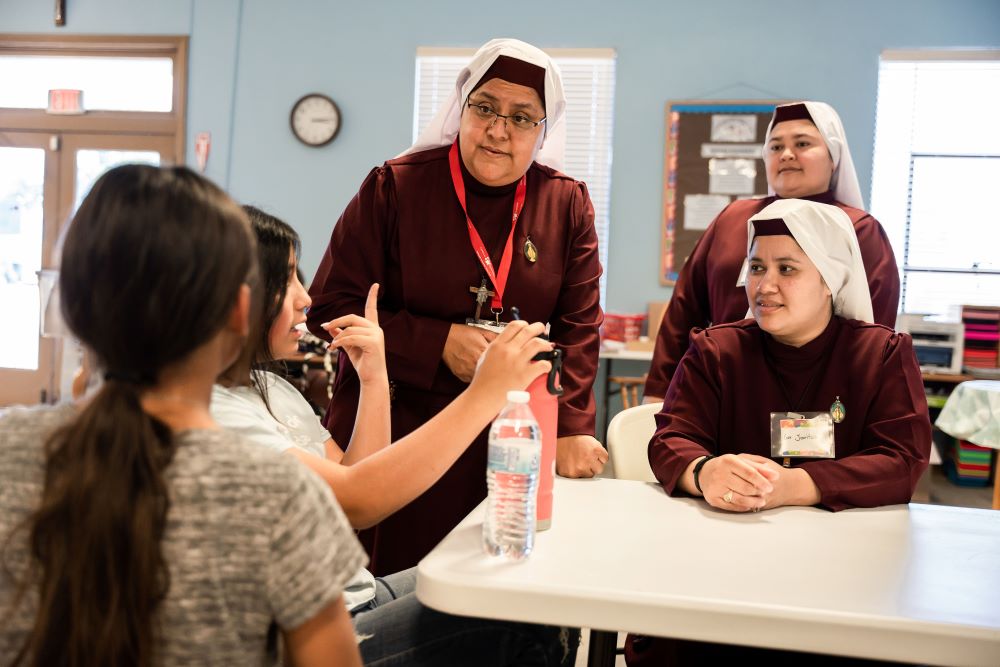
Thirteen sisters joined Teresian Sr. Dolores Aviles at Camp I-CAN, which provided children in the third, fourth and fifth grades at Robb Elementary School a space to heal from the May 24 shooting at the school that killed 19 students and two teachers. (Courtesy of Catholic Extension)
Aviles said she felt a strong calling "to minister to the very people she grew up with," the statement said, noting that three children of Aviles' cousins were killed.
"Jesus simply said to me, 'Let the children come to Me', and that is exactly what this camp was designed to do," Aviles said in the statement. "This week, we wanted the children and their families to know that we are praying for them, we love them, and that we will also take action for them. That's what community is. We support each other. God sends us out two-by-two."
Catholic Extension has a long history of work in Uvalde, including helping to build Sacred Heart Church in 1906 and Sacred Heart Catholic School in 1912, two institutions still in the community.






